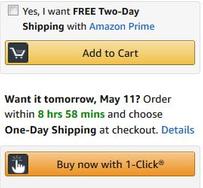 Several publishers and authors organizations have officially joined the many book world people criticizing Amazon's new policy allowing third-party booksellers to "bid" for the primary spot in buy buttons. The change was discussed in detail last week in the Huffington Post by author and publisher Brooke Warner.
Several publishers and authors organizations have officially joined the many book world people criticizing Amazon's new policy allowing third-party booksellers to "bid" for the primary spot in buy buttons. The change was discussed in detail last week in the Huffington Post by author and publisher Brooke Warner.
A statement from the Authors Guild called the move "deeply disturbing" and said it "has the potential to decimate authors' and publishers' earnings from many books, especially backlist books." It noted, too, that the policy--which could result in " 'new' or 'new condition' copies that seem to be available for almost every book" being featured for all buy buttons--might be connected with Amazon's desire to force publishers to use its print-on-demand services, if POD availability will essentially guarantee a top spot on buy buttons. Such an arrangement, the Guild wrote, "looks an awful lot like a 'tying' arrangement under the antitrust law."

In a statement, the Independent Book Publishers Association said it believes the new Amazon policy "hurts authors and publishers," and outlined many concerns similar to those of the Authors Guild, including that "Amazon, once again, is attempting to drive down the value of books, and therefore intellectual property and creative work in general." The organization emphasized that under the new approach, "publisher listings may fall off the buy page completely--at Amazon's discretion."
The IBPA also observed that "while in some cases authors may still be making royalties off of third party sales, these sellers may also be obtaining books in ways that will not result in author compensation," particularly if those books are used, recycled, hurts from wholesalers and distributors, reviewer copies, etc. It added, "If consumers don't see the option to buy new, from the publisher, then Amazon is promoting piracy. Authors get nothing from used books because the consumer is buying something that's already been bought and tracked as a sale. If this new policy takes hold for most backlist books, authors' and publishers' revenue will dry up, and more and more books are at risk of going out of print more quickly. Publishers will not be able to afford to keep books in print that are not selling on Amazon. So, this policy is essentially driving books to an earlier death--and thereby hurting authors."
And in the U.K., while noting that Amazon's buy button protocols haven't changed, the Society of Authors CEO Nicola Solomon told the Bookseller that the organization is concerned about a flood of cheap books appearing on Amazon. "We suspect that often they are 'leaked' from high discount or special sales deals made by publishers for example to book clubs," she said. "Authors generally receive very low royalty rates on such sales, much less than on a full priced sale of the book and nothing on the resale and of course the publisher suffers in the same way." Another source may be special export editions that either return to the U.K. immediately--or never leave.
She noted, too, that "we have long noticed that paperback copies are usually available on Amazon from other sellers well before they are available from the publishers, often on publication of the hardback. Where do these books come from?"

